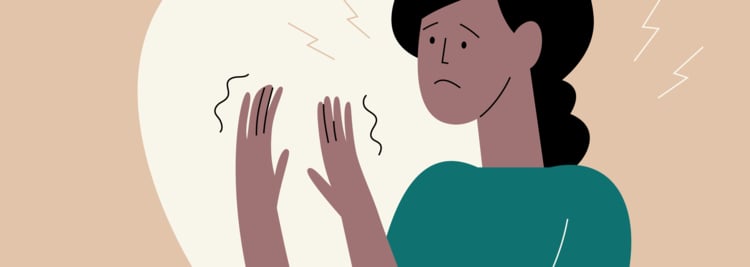Do you often find yourself plagued with worry, even when there’s nothing to worry about? Today, Flo gives you more information on the ins and outs of generalized anxiety disorder.
-
Tracking cycle
-
Getting pregnant
-
Pregnancy
-
Help Center
-
Flo for Partners
-
Anonymous Mode
-
Flo app reviews
-
Flo Premium New
-
Secret Chats New
-
Symptom Checker New
-
Your cycle
-
Health 360°
-
Getting pregnant
-
Pregnancy
-
Being a mom
-
LGBTQ+
-
Quizzes
-
Ovulation calculator
-
hCG calculator
-
Pregnancy test calculator
-
Menstrual cycle calculator
-
Period calculator
-
Implantation calculator
-
Pregnancy weeks to months calculator
-
Pregnancy due date calculator
-
IVF and FET due date calculator
-
Due date calculator by ultrasound
-
Medical Affairs
-
Science & Research
-
Pass It On Project New
-
Privacy Portal
-
Press Center
-
Flo Accuracy
-
Careers
-
Contact Us
Generalized Anxiety Disorder: Common Symptoms, Causes, and Treatment


Every piece of content at Flo Health adheres to the highest editorial standards for language, style, and medical accuracy. To learn what we do to deliver the best health and lifestyle insights to you, check out our content review principles.
What is generalized anxiety disorder?
Anxiety is a mild to severe feeling of uneasiness, fear, or worry. Everyone experiences these feelings at some point in their lifetime ‒ like right before a job interview or during a final exam.
However, for some individuals, this is more than just an occasional occurrence. Are you struggling to keep these constant feelings of anxiousness in check? Are they starting to interfere with your daily life?
People with generalized anxiety disorder (GAD) might believe that a disaster is just around the corner. They’re always preoccupied with concerns over health, finances, work, family, or relationship issues. The level of concern seems disproportionately high for the problem at hand, and people with GAD tend to focus on the worst-case scenario.
Generalized anxiety disorder symptoms
Psychological symptoms of generalized anxiety disorder vary, but may include the following:
- Persistent anxiety regarding numerous things that are unlikely to happen and bear little resemblance to the actual facts of the situation
- Overthinking and creating plans or solutions for all the worst possible outcomes
- Seeing life events and scenarios as threatening, even without reason
- Difficulty tackling uncertainty, or setting aside a worrisome thought
- Indecisiveness, produced by the constant fear that you’ll make the wrong decision
- Inability to feel calm and relaxed, with a tendency to instead feel restless and on edge
- Problems with concentration and a feeling that your mind will go blank
Physical generalized anxiety disorder symptoms might include:
- Fatigue
- Muscle aches or tension
- Trouble sleeping
- Twitching and trembling
- Getting startled easily or being nervous
- Sweating
- Irritability
- Signs of irritable bowel syndrome (IBS), such as diarrhea, nausea, etc.
Such symptoms of generalized anxiety disorder can significantly disrupt your work and personal life. Note that the reasons behind these worries could change over time, as you become older, and from one topic to another.
Unfortunately, GAD affects children and teenagers as well. Their generalized anxiety disorder symptoms might include undue concern over:
- Performance at school or in extracurricular activities like sports
- Safety of family members
- Punctuality
- Catastrophic events such as nuclear war, earthquakes, etc.
Furthermore, a young person with generalized anxiety disorder might demonstrate the following behaviors:
- Becoming preoccupied about fitting in with peers
- Striving for perfection
- Redoing tasks they believe weren’t done perfectly the first time
- Spending excessive amounts of time doing their homework
- Showing a lack of confidence
- Going to great lengths to get approval
- Needing a lot of reassurance about their performance
- Frequent physical symptoms (e.g., stomach aches)
- Avoidance of school or social events
Causes of generalized anxiety disorder
Similar to other mental health conditions, generalized anxiety disorder is most likely the product of complex interactions between environmental and biological factors, including:
- Differences in brain function and chemistry
- Genetics
- Variations in the way threats are perceived
- Overall personality and development
Other contributing factors
The diagnosis of generalized anxiety disorder is made slightly more often in women than in men. You may be more prone to developing generalized anxiety disorder based on the following things:
- Personality
If you have a negative or timid temperament or avoid anything dangerous, you might be more vulnerable to GAD.
- Life experiences
Have you undergone significant changes or lived through negative or traumatic events (whether recently or during childhood)? Chronic medical conditions or other mental health disorders boost your chances, too.
- Genetics
Research shows that GAD has a tendency to run in families.
Take a quiz
Find out what you can do with our Health Assistant
Possible complications
Generalized anxiety disorder is in some ways debilitating, and its complications could include:
- Hindering your ability to do tasks quickly and efficiently due to concentration problems
- Diverting your time and focus away from other activities
- Lowering energy levels
- Susceptibility to sadness and depression
Generalized anxiety disorder also produces or aggravates medical conditions like:
- Bowel or digestive problems, such as ulcers or IBS
- Migraines and headaches
- Insomnia
- Issues related to the health of your heart
Since generalized anxiety disorder very frequently occurs in association with other mental health disorders, diagnosis and management are quite challenging. They commonly occur in conjunction with:
- Phobias
- Post-traumatic stress disorder (PTSD)
- Panic disorder
- Obsessive-compulsive disorder (OCD)
- Suicide or suicidal thoughts
- Depression
- Substance abuse
Diagnosis and treatment of generalized anxiety disorder
To diagnose GAD, your doctor or mental health professional might do several things:
- Perform a physical examination to identify whether your anxiety is due to medications or an underlying medical problem
- Conduct specific urine or blood tests
- Ask detailed questions regarding your symptoms and medical history
- Utilize psychological questionnaires to reach a diagnosis
- Follow the guidelines written in the Diagnostic and Statistical Manual of Mental Disorders (DSM-5)
Common treatment of generalized anxiety disorder
Two of the main options are medication and psychotherapy. Combining both forms of treatment usually offers the best prognosis for the patient.
Psychotherapy
Also referred to as psychological counseling or talk therapy, psychotherapy includes working with a counselor or therapist. It may help to reduce your symptoms of generalized anxiety disorder.
One of the most effective forms of psychotherapy is cognitive-behavioral therapy (CBT). The goal of CBT is to teach you skills for managing your anxieties and slowly returning to the activities you previously avoided.
Medications
Be sure to fully discuss with your doctor the various benefits and potential side effects of medications, which may treat generalized anxiety disorder. Generalized anxiety disorder treatment options may include:
- Antidepressants
Serotonin, norepinephrine reuptake inhibitors (SNRIs), and selective serotonin reuptake inhibitors (SSRIs) are among such options. However, your doctor may also prescribe other types of antidepressant medications.
- Buspirone
It’s designed to treat anxiety for a longer duration. Similar to most antidepressants, buspirone usually takes up to a few weeks to show noticeable results.
Home and lifestyle remedies

Though the majority of patients with generalized anxiety disorder may need medications, psychotherapy, or both, certain lifestyle changes could also prove beneficial. Consider taking the following steps:
- Stay physically active most days of the week. Regular exercise relieves stress, improves mood, and boosts general health. Start slowly and increase the intensity and frequency gradually.
- Get plenty of sleep. If you don’t feel rested or aren’t sleeping properly, consult your doctor.
- Use relaxation techniques to alleviate symptoms of generalized anxiety disorder, such as yoga, meditation, and visualization.
- Eat a healthy, well-balanced diet. Though it requires further research, consuming fruits, vegetables, fish, and whole grains may contribute to treating anxiety.
- Steer clear of recreational drugs and alcohol as these may worsen symptoms of generalized anxiety disorder.
- Limit your caffeine intake and quit smoking ‒ both caffeine and nicotine aggravate anxiety.
Alternative medicine
Studies on herbal remedies for generalized anxiety disorder garnered mixed results, with many patients reporting no benefits at all. Certain herbs, like valerian and kava, might be linked to serious liver damage, while theanine or passionflower have a potentially calming effect. However, most remedies contain multiple ingredients, and it’s hard to identify exactly which one is ideal for treating generalized anxiety disorder.
Remember to consult your doctor before trying any herbal supplements to prevent interactions with prescribed medications.
How to cope and get support
- Stick your treatment plan and remain consistent.
- Work with your counselor to pinpoint the cause of your anxiety, and then take steps toward addressing it.
- Whenever you feel symptoms of generalized anxiety disorder coming on, go for a walk, or engage in a favorite hobby. This helps refocus your mind on something positive.
- Don’t dwell on things in the past, which can no longer be changed.
- Socialize with your loved ones and participate in enjoyable activities.
- Join a support group for those with generalized anxiety disorder. Here you’ll hopefully find compassion, understanding, and a way to bond over shared experiences. Check online for organizations like the National Alliance on Mental Illness (NAMI).
How to prevent generalized anxiety disorder
Though it’s tough to predict what causes generalized anxiety disorder, consider taking these steps to keep the situation from worsening:
- Seek help as early as possible as symptoms of generalized anxiety disorder may become more pronounced over time.
- Prioritize your life. You might significantly decrease anxiety by managing your time and energy a bit more carefully.
- Keep a journal to try and identify the causes of your stress and what alleviates your symptoms.
- Do not engage in substance abuse as drugs, alcohol, and cigarettes all have a detrimental effect on anxiety.
Takeaway
Generalized anxiety disorder is one of the most common mental disorders affecting people of all ages, and can interfere with your daily life. Consult a health care practitioner to learn how to tackle the disorder. They may prescribe medications, recommend psychotherapy, or both, to battle general anxiety disorder. Making lifestyle adjustments may further relieve symptoms.


Hey, I'm Anique
I started using Flo app to track my period and ovulation because we wanted to have a baby.


The Flo app helped me learn about my body and spot ovulation signs during our conception journey.


I vividly
remember the day
that we switched
Flo into
Pregnancy Mode — it was
such a special
moment.
Real stories, real results
Learn how the Flo app became an amazing cheerleader for us on our conception journey.




